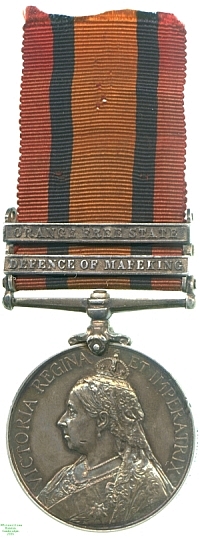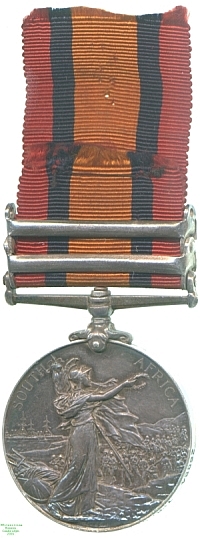
Obverse, a bust of Queen Victoria with veil

Reverse, Britannia in the foreground facing right holding a standard and waving a wreath over an army marching along the shore, with ships offshore in the background

Obverse, a bust of Queen Victoria with veil |

Reverse, Britannia in the foreground facing right holding a standard and waving a wreath over an army marching along the shore, with ships offshore in the background |
During the 1830s and 1840s several Dutch republics had been established outside the British Cape Colony in South Africa, among which were Transvaal and the Orange Free State, all now in modern South Africa. Transvaal was annexed briefly by the British but its independence re-established in the First Boer War.
In the 1880s however the discovery of vast gold reserves in Transvaal brought large numbers of foreign settlers, largely British, across the border, and an attempted coup at the instigation of Cecil Rhodes in 1895. Military escalation followed, negotiations failed and the two Boer republics, convinced that the British intended annexation, declared war in the Cape Colony in October 1899.
The immediate result was the siege of British troops in Ladysmith, Mafeking and Kimberley, while field forces attempting to come to their relief were defeated in several open battles by Boer contingents. Kimberley, the first town to be relieved, could open its gates only in mid-February; Mafeking, famously, had to hold out until May. This medal is inscribed to Trooper G. W. Davies of the Prince of Wales Light Horse; this unit did not serve among the defenders of Mafeking en masse but individuals on secondment from other units were awarded the bar, and it may be that Davies was one of these.
By now Boer resistance in the field was more or less defeated but their forces maintained a bitter and obdurate guerilla campaign in several areas of the two Republics until mid-1902, when a surrender was finally agreed. One of the areas where resistance was most difficult to quell was the heartland of the Orange Free State, for service in which territory between February 1900 and the 1902 surrender the second bar that this medal carries was awarded.
The earliest issues of the medal indicate that the War was not expected to last as long as it did, as they bear the dates 1899-1900 in the reverse field. Very few were issued in this state, but a large number of the first issues show signs of the dates' erasure, often as in this case insufficiently thorough. Lester Watson acquired the medal at some point before 1928.